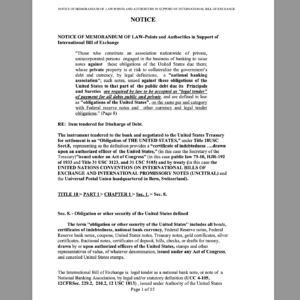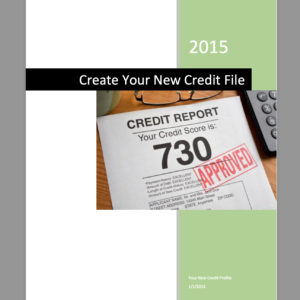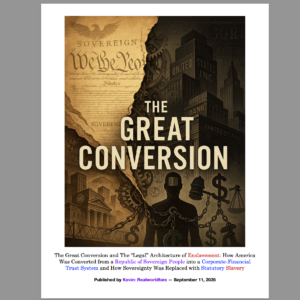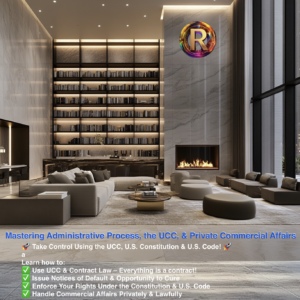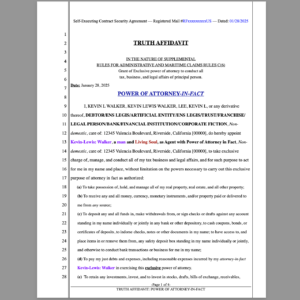The term “Sovereign Citizen” is a weaponized slur—a derogatory, defamatory, and slanderous label used by incompetents, traitors, and terrorists. It is aimed at discrediting a living man or woman who understands that everything operates on a commercial basis, as evidenced by Article 1, Section 8, Clause 3 of the U.S. Constitution, and 27 CFR § 72.11, which defines just about all crimes as “commercial crimes.”
Such men and women who claim sovereignty typically do not fully grasp the distinctions between public and private law, but they still possess the intelligence to comprehend these concepts at a deeper level than majority of the population and general public, all of whom are deemed “incompetent” and need an attorney to represent them in and their interests.
The Origin and Evolution of the Term:
The term “Sovereign Citizen” originated from state Citizens and American patriots who reserve their rights, claim their estate and exemption from the United States, and expatriate from the commercial democracy to remain in the private, de jure republic.
However, over time, this term has been weaponized and evolved into a propaganda tool used by incompetents, traitors, and terrorists to target those with legitimate understanding and claims.
Public Misunderstanding Due to Propaganda and Lack of Legal Education:
The general public often lacks comprehension of the courts and their processes. This lack of understanding is due to poor education and deliberate misinformation campaigns. The public is not adequately educated on the differences between law and statutes, legal procedures, and other vital aspects of law. As a result, people tend to believe propaganda—which is legal—that is spread by privately owned media corporations, which they mistakenly perceive as government entities.
This confusion is further exacerbated by the fact that the government itself is a federal corporation, as stated in 28 U.S. Code § 3002, which is part of the “Sovereign Statutes” known as the United States Code:
“The United States means— (A) a Federal corporation.”
The general population is generally unaware of this fact, and the private nature of the media allows for the spread of misinformation aligned with corporate and governmental agendas. This misperception leads people to misinterpret the actual structure of their legal and political systems.
Common Misunderstandings and Misuse of the Term
In general, individuals labeled as “Sovereign Citizens” typically exhibit a lack of full comprehension in several areas:
1. Improper Self-Identification: They often incorrectly identify themselves as “American State Nationals,” “Sovereign Citizens,” or “State Nationals,” instead of correctly referring to themselves a a “national,” “non-citizen national,” “state Citizen,” “private citizen,” or “Sovereign.”
2. Lack of Understanding of Significant Legislation:
- House Joint Resolution 192 (June 5, 1933), Public Law 73-10.
- The Gold Reserve Act of 1934, Public Law 73-87, Title III, Section 3.
- House Joint Resolution 348, Public Resolution, Number 63.
- Article 1, Section 10, of the U.S. Constitution.
- The 1940 Buck Act and the concept of “Federal Areas.”
3. Confusion in Public and Private Law: They may approach legal matters with a dual-minded understanding, failing to operate sui juris, In Propria Persona, or by Special Limited Appearance.
4. Identification with Their Straw Man: They might be partially mentally incompetent, thinking they are their straw man, which is the legal entity (straw man/bank/person/individual/U.S. citizen) created by the state.
5. Reliance on Public Benefits and Social Security Numbers: Many continue to use Social Security Numbers or accept benefits and privileges from the United States, contradicting their claim of Sovereignty.
6. Inability to Make Proper Legal Declarations: They often lack the capability to create their own unsworn declarations “without the United States,” as specified in 28 U.S. Code § 1746.
7. Jurisdiction and Legal Procedures: They typically do not fully comprehend jurisdiction, how to abate matters, or how to reserve their rights properly in accordance with U.C.C. § 1-308.
8. Incompetence in Legal Actions:
- Unable to create and execute a conditional acceptance.
- Unable to complete administrative procedures effectively.
- Dependence on an Attorney In Fact for tax assessments and legal processes.
9. Lack of Understanding in Contractual and Commercial Law:
- Fail to comprehend “minimum contacts” and “invisible contracts.”
- Misunderstand fundamental concepts like “offer and acceptance,” the “mailbox rule” (posting rule), and the distinction between public and private law.
10. Errors in Legal Documents: They often place blank indorsements on negotiable instruments and currency without understanding the implications.
11. Confusion Between Rights and Privileges: They may not distinguish between the “right to travel” and the “privilege of driving.”
12. Misunderstanding Legal Frameworks:
- Lack of understanding of the “Sovereign Statutes” found in the United States Code.
- Limited comprehension of the Uniform Commercial Code (UCC) and its application in asserting one’s rights.
13. Secured Party Status and Private Banking:
- Often, they are not secured parties or secured creditors.
- They fail to establish their own private UCC contract trusts to manage and maintain private banking ledgers.
14. Lack of Knowledge in Key Legal Areas: Many do not fully understand contract law, trust law, tax law, common law, Constitutional law, commerce, and banking.
The Role of the People as Founders and Owners of the United States
The United States, as a federal corporation, cannot exist without its founding members and owners—the people. The authority of the people is central to the legitimacy and operation of the United States. Without the people, the structure and governance of the United States would have no foundation or legal standing. It is essential for individuals to reclaim their understanding of law, sovereignty, and their inherent rights to correct misconceptions and take back their rightful position within the legal framework.
Conclusion: Reclaim the Term “Sovereign Citizen” and Take Back Your Power
The term “Sovereign Citizen” has been weaponized to discredit those who seek to understand and exercise their rights. True Sovereignty requires a deep comprehension of Law, statutes, codes, commerce, and government structures, and importantly how to properly apply the information to receive their remedy.
The weaponization and misuse of the term often reflects the general public’s lack of knowledge, shaped by inadequate education, propaganda, and deliberate misinformation through privately owned media. Many are unaware of the federal corporate nature of the government (28 U.S.C. § 3002) and the true role of the people as the sovereign authority. Those labeled as “Sovereign Citizens” frequently demonstrate gaps in their understanding of these critical areas, failing to grasp the complete picture of law, sovereignty, and governance. Proper education and awareness are essential to dismantle these misconceptions and empower individuals to reclaim their rights.
Don’t shy away from the term “Sovereign Citizen” due to ego, cognitive dissonance, or lack of understanding. Embrace it, reclaim its true meaning, and take the power back. The term “Sovereign Citizen” is often misrepresented and weaponized as propaganda against those who comprehend the true nature of law and sovereignty.
By understanding the reality behind it, you can dismantle the falsehoods that have been spread. It’s crucial to recognize that you cannot be both a “Sovereign” (a free, self-governing individual) and a “Citizen” (a subject under jurisdiction) at the same time. By embracing and redefining the term, you strip away the power of those who use it to attack, and you reclaim its essence: the recognition of one’s individual sovereignty while exposing the commercial and legal system that tries to reduce people to mere subjects.
By validating the concept of a “Sovereign Citizen” and understanding its true meaning, you also expose the propaganda designed to suppress it. The confusion and misrepresentation surrounding the term often lead people to dismiss legitimate questions such as: “Is the straw man/ens legis/individual/bank/trust/corporation/franchise a real thing?” In reality, these concepts are integral to understanding how the legal and commercial systems operate, and embracing this knowledge is the first step in reclaiming your rights and standing as a truly sovereign being.




